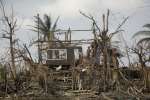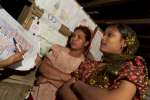Welcome to Prague: first Myanmar refugees resettle in Czech Republic
News Stories, 31 October 2008

PRAGUE, Czech Republic, October 31 (UNHCR) – With curious, enthusiastic laughter and smiles, 23 Myanmar refugees touched down at Prague-Ruzyne International Airport late Thursday afternoon, bringing the Czech Republic into the ranks of eight European Union countries that annually open their doors to refugees through formal resettlement programmes.
Shrugging off a 24-hour journey across seven times zones and a drop of 30 degrees Celsius between Kuala Lumpur and Prague the refugees, already clad in warm winter clothing, told waiting Czech journalists of their excitement.
"I am very much looking forward to my new home in the Czech Republic," said Sui Zi. "I also very much hope to learn new skills, which will help me one day to help my native country, Myanmar."
The pilot resettlement programme, approved by the cabinet in June this year, "is part of the Czech Republic's foreign policy, providing humanitarian assistance where it can make a positive impact," said Katerina Stehlikova, of the Czech Interior Ministry.
Becoming a resettlement country is yet another milestone for the Czech Republic, which emerged from decades of isolation under Soviet domination as part of Czechoslovakia less than 20 years ago. Born as a new nation in 1993, the Czech Republic joined the European Union in 2004.
The Czech pilot programme is aimed at assistance to vulnerable refugees; top consideration was given to survivors of trauma and refugees with serious medical problems or protection needs. One six-year-old boy is expected to undergo a serious heart operation in the Czech Republic.
After their arrival in Prague, the five families with their young children were taken to a refugee protection centre in Straz, some two hours north of the Czech capital, for 10 days of initial registration and medical check-ups, helped by a social worker and an interpreter. After that they will begin intensive language training and specialized orientation courses at the centre to learn about their new homeland. Within six months, the authorities hope to find private accommodations for each family.
The State Integration Programme offers help with housing and employment as well as free intensive language course, and local NGOs will also play in important role in helping the new arrivals settle in.
Some of the refugees had spent nearly 10 years in exile in Malaysia, and resettlement was seen as the only solution for them. Despite the daunting changes they were facing in moving so far away, they looked forward to their new lives with optimism.
"We've learned that they have freedom in the Czech Republic, which is different from Myanmar," Faw Lai Tha, a 34-year-old ethnic Chin man, said just before leaving Malaysia with his pregnant wife. "They can work wherever they want in peace and can learn whatever they want. In Burma we're not allowed to learn or to live in a peaceful environment."
Another refugee, Biak Hnin, also a Chin, agreed that "we're extremely excited to start a new life where we'll be safe from torture and persecution." Although he was a farmer in Myanmar, he said he and his wife "will take any job we can: cooking, serving in a restaurant or working on farms."
Speaking before the family left Kuala Lumpur, he and his wife were also thrilled that their six children would get a good education in the Czech Republic. "I'm not sure what they'd like to learn the most," he said. "They're just excited for the opportunity to learn anything."
By Marta Miklusakova in Prague, Czech Republic
and Yante Ismail in Kuala Lumpur, Malaysia

















































